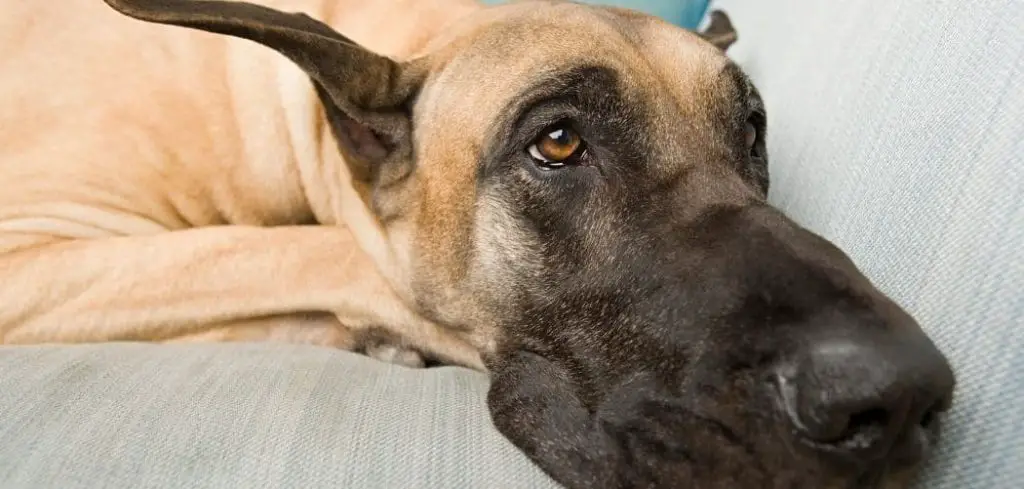It can be concerning for pet owners to notice mucus in their dog’s poop, especially following an episode of diarrhea.
While some mucus is normal in the digestive process, an increase or change in appearance often signals irritation or illness in the gastrointestinal tract.
We outline the common causes of mucus in a dog’s poop after diarrhea, what you can do at home, and when to seek veterinary help.
Table of Contents
Mucus in Dog Poop After Diarrhea — Why It Happens
When mucus appears in a dog’s stool after diarrhea, it usually indicates that the intestines are inflamed or irritated. The colon naturally produces mucus to protect its lining, but too much often means it is trying to soothe itself after stress. Causes may include infections, parasites, dietary indiscretion, inflammatory bowel disease, or pancreatitis.
Dogs may also experience lingering inflammation after diarrhea even if the initial trigger has passed.

Mucus in Dog Poop After Diarrhea: Common Causes
Colitis
Colitis is inflammation of the colon and one of the most common reasons for mucus in dog poop after diarrhea.
The colon secretes extra mucus when irritated, leading to slimy or jelly-like stools.
Dogs with colitis may strain, pass small amounts of stool more frequently, and appear uncomfortable. While mild colitis can sometimes resolve, chronic or severe cases need veterinary care.
Read more: Mucus in Dog Poop After Constipation] (Why it happens)
Dietary Indiscretion
Dogs are notorious for eating things they shouldn’t — such as spoiled food, table scraps, or garbage.
This can cause diarrhea followed by mucus as the colon works to recover. Owners often notice vomiting, gas, or temporary appetite loss along with loose stools.
While some dogs improve quickly, persistent mucus may signal ongoing irritation or damage that requires treatment.
Intestinal Parasites
Worms such as whipworms, hookworms, or giardia can trigger diarrhea and ongoing mucus in stools.
These parasites damage the intestinal lining, making the colon secrete extra mucus as a protective measure.
Dogs may also lose weight, have a dull coat, or show changes in appetite. Regular fecal exams and parasite prevention are key to avoiding this cause.
Inflammatory Bowel Disease (IBD)
IBD is a chronic condition where the immune system mistakenly attacks the intestinal lining.
Dogs with IBD may suffer bouts of diarrhea with mucus, often recurring over time. Other signs include vomiting, weight loss, and poor appetite. Because IBD is ongoing and uncomfortable, it requires veterinary management through diet, medication, and careful monitoring.
Bacterial or Viral Infections
Infections such as salmonella, parvovirus, or campylobacter can inflame the gastrointestinal tract. These often cause sudden diarrhea, sometimes with blood and mucus.
Dogs may appear lethargic, dehydrated, and may refuse food. Because infections can be serious and contagious, prompt veterinary evaluation is important.
Pancreatitis
Pancreatitis is inflammation of the pancreas, often triggered by fatty foods. When the pancreas is irritated, it affects digestion and can cause diarrhea, vomiting, and mucus in stools.
Dogs may seem painful in the abdomen, lethargic, and unwilling to eat. This condition is very serious and can be life-threatening without veterinary care.
Read more: Slime or Mucus in Dog Poop] (Understanding this common symptom)
What to Do If Your Dog Has Mucus in Their Poop After Diarrhea
If the mucus appears once or twice after a short bout of diarrhea, it may simply be the colon’s way of healing. Provide fresh water, allow your dog to rest, and consider a bland diet of boiled chicken and rice for a couple of days.
You can also monitor stool closely to see if it improves in consistency. Adding probiotics recommended by your vet may help restore balance in the gut. Keeping your dog away from garbage, spoiled food, or sudden dietary changes can also prevent further irritation.
However, if mucus persists, worsens, or is paired with other concerning symptoms, professional care is needed.
When to Call or Visit Your Vet
Call your veterinarian if the mucus continues for more than a few days or if your dog also has other signs of illness. These may include blood in the stool, repeated vomiting, severe diarrhea, lethargy, or refusal to eat.
Seek urgent care if your dog is very young, very old, or has existing health conditions, as these dogs are more vulnerable to dehydration and complications.
If your dog strains to defecate but produces only mucus or very little stool, this may also signal a blockage or serious inflammation. In such cases, immediate veterinary attention is required.
Read more: Orange Mucus in Dog Poop (What it means for your dog’s health)
Key Takeaway
Mucus in dog poop after diarrhea often reflects irritation in the colon and may stem from dietary changes, parasites, infection, IBD, or even pancreatitis.
While mild cases can sometimes resolve with rest and a bland diet, persistent or severe mucus is a sign to seek veterinary care.
Prompt attention ensures your dog receives the right treatment and helps prevent small digestive issues from becoming serious health problems.
